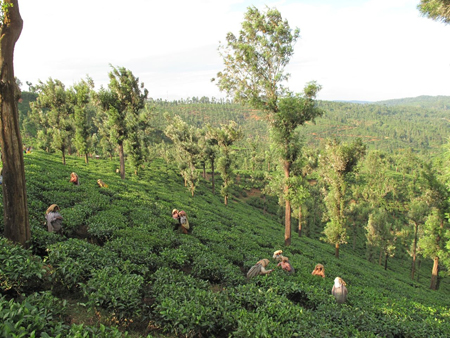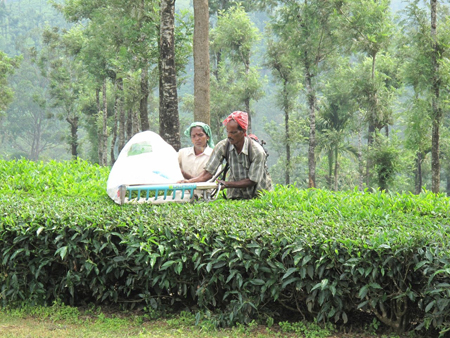
Subhashini Chandran (known as ‘Shuba’) studied for her BSc in International Relations from 1991-94. Here she reflects on her experience in the International Relations Department and what it meant to her and her subsequent career.
Writing for the alumni blog had me excited and apprehensive – reflecting back 21 years has meant having to stoutly acknowledge the passing of these many years! It has been an exhilarating and unexpected journey from the moment I walked in to the Old Building as a wide-eyed 17 year-old fresher to growing tea in India.
My work over the last two decades has been about empowering women as tools of development and managing profit goals with social responsibility, thus illustrating the role of social enterprise in achieving sustainable economic progress. Lessons learned at LSE have had significant influence and impact on the course I have traveled since graduating in 1994. My undergraduate years as an IR student were pivotal in honing the value system that influenced the paths I chose to tread, and equipped me with the knowledge and skills that were required to undertake these challenging tasks.

I schooled at an American Missionary boarding school hidden in the pristine hills of Kodaikanal in the deep rural south of India. That’s where I spent my adolescence, under the careful eye of good Christian teachers, studying amongst students from two-dozen odd countries in the oldest international school on the sub-continent. Given this liberal, multi-cultural setting, my peers and I believed we were wise to the world, oblivious to the extent of privilege and protection extended us. Graduating top of my class added confidence to ignorance.

Thus, I arrived at Passfield Hall – a brash teenager, sporting two pigtails, convinced the world was waiting for me to save and conquer it, all at once. It took a day of ‘hanging out’ on Houghton Street to bring me back to earth, albeit to a much privileged County, as I would realize in the years that followed. My first day at LSE was humbling and overwhelming. Houghton Street was milling with new arrivals, the air – electric. I met students from places I was yet to hear of, heard stories of conflict and war some had lived through and exotic travels others had undertaken in their ‘gap year’ (a most alien concept for an Indian at the time). I discovered The Three Tuns and a whole new meaning to freedom – I had the right to have a drink most any time. I began frequenting, unaware it was the venue for British Politics 100 and soon found myself eagerly rushing to my favourite evening class regularly!
It was also the day I met my two best friends, one of whom I owe my choice to pursue IR as a degree. I had enrolled in the Economics program, unaware of the option to read International Relations. My friend chose a course offered by the IR department as an elective and suggested I consider it. Two weeks into Michaelmas term, I was an IR degree student. In comparison to the strength on the Economics program we were an intimate group. We studied the roles and relationships governing international society. I belonged. I enjoyed every minute of the next three years – lectures, seminars, and tutorials, save an elective course in statistics! Most of all, I cherished the abundance of free flowing conversation with fellow students and faculty, particularly my tutors – Professor Paul Taylor and Mr. Geoffrey Stern, and the quails eggs Professor Christopher Coker generously offered us, to soften the blow of his grading!
I moved on to read law at City University. Soon after, I joined an Indian firm that had invested in a UK renewable energy business to manage the relationship between the partners – a role that required an appreciation of multiple interests. It was the first use of my IR education.

I am from a family of tea farmers. In 1999, the Indian tea plantations industry suffered an unprecedented recession. I returned home to my first entrepreneurial venture. The recession lasted eight long years. Over 40 employers in the organized plantation sector in South India abandoned operations, leaving 90,000+ workers unemployed. During this period I revived four unviable plantations with aggregate losses of US$ 8.8 million. These are now the Woodbriar Group, supporting a 30,000+ employees and dependents’ community, producing 16 million kilograms of tea annually, and other crops.

Through the years, I have found myself accountable to belligerent workers (who had no regular work and income), banks, and stakeholders. I have lobbied industry bodies, bureaucrats and politicians, negotiated with financial institutions, trade unions, and state governments. In 2006, I spearheaded the acquisition of Unilever Limited’s entire South Indian plantations and for the first time, an Indian public sector bank financed a land based agri-business acquisition. The successful merger of this unit made Woodbriar India’s largest privately owned tea plantations business.

While these accomplishments were significant to our shareholders, that which I am most proud of is on the social side – being able to directly impact on poverty reduction by facilitating large-scale permanent employment providing income, social security and capacity development to promote sustainable inclusive economic growth in regions where the local population has scant alternative sources of income. It is during my time at LSE I discovered myself and gained the courage to make the choices that have made for two terrific, meaningful decades. It is as a student of IR I learned there are many sides to every story and many more causes for the way things are – lessons that serve me well to this day.
Subhashini Chandran
BSc IR 1991-94




